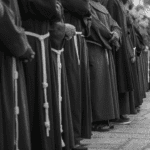The documents of Vatican II have been stirring controversy ever since the council closed nearly 60 years ago. Few are as hotly debated as “Dignitatis humanae” — the declaration on religious freedom.
Some Catholics say this document contradicts previous Church teaching on the subject by presenting a more liberal stance — focusing on an individual’s religious freedom at the expense of evangelization.
What does “Dignitatis humanae” actually say? Let’s take a look.
“Dignitatis humanae” is just as much about the Church’s right to evangelize as it is about individual liberty.
Many people think this declaration talks solely about the individual citizen’s freedom from coercion from civil society in religious matters. It does deal with that, as well as the individual’s responsibility to seek and embrace the true faith.
The declaration also positively affirms the right of the Church to evangelize due to the divine mandate it received from Christ. No government has the right to interfere with this mission. Vatican II was held at a time when communist societies held sway in many places and Catholics were persecuted.
Why is this important? Some Americans have taken an extreme interpretation of the concept of separation of Church and state to mean that the Church has no right to share the Gospel in the public square. Religion, they argue, should be a private matter.
But Christ didn’t just tell us to develop a personal relationship with Him. He said, “Go into all the world and preach the gospel to the whole creation” (Mark 16:15). This didn’t mean preach only to those who want to hear it. Our Lord assured us that some people would hate those who share the Good News, and we should count that persecution as a blessing.
Vatican II strongly reaffirmed the traditional teaching of the right of the Church to evangelize and the need for civil governments to recognize this freedom.







